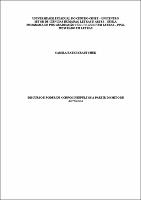| Compartilhamento |


|
Use este identificador para citar ou linkar para este item:
http://tede.unicentro.br:8080/jspui/handle/jspui/1696| Tipo do documento: | Dissertação |
| Título: | Discurso e poder de corpos insepultos a partir do mito de Antígona |
| Autor: | Krautchuk, Camila Ratki  |
| Primeiro orientador: | Witzel, Denise Gabriel |
| Resumo: | Partindo do princípio de que os discursos de Antígona (442 a.C.) da tragédia grega de Sófocles – que queria enterrar o corpo do irmão – é um acontecimento que ressoa em um sem número de narrativas, reescritas, comentários e interpretações, propomo-nos neste estudo focalizar a cena da desobediência da filha de Édipo diante do rei e analisar sua atualidade em outras narrativas em que uma mulher se choca com o poder soberano, porque é sua “obrigação” enterrar um morto, dar-lhe sepultura. Propomo-nos revisitar esse mito e analisar, sob a ótica dos Estudos Discursivos Foucautianos, o acontecimento de sua volta em narrativas nas quais a mulher se destaca pela transgressão e desobediência. Nessa direção, damos visibilidade sobretudo às memórias construídas sobre Zuleika Angel Jones (1921-1976), a Zuzu Angel, a famosa estilista de modas que se tornou uma ativista política nos anos de chumbo da ditadura militar brasileira. Após o desaparecimento de seu filho e da certeza de que ele estava morto, ela trava uma verdadeira batalha contra o regime da época numa busca incansável, corajosa e desobediente – tal como Antígona – pela procura do corpo de seu filho. Somam-se à Zuzu Angel as Mães da Praça de Maio que procuravam – e até hoje procuram – pelos filhos perdidos durante a ditadura militar argentina. Assim, o principal objetivo da dissertação é analisar e descrever os discursos sobre o corpo insepulto que aproximam, interdiscursivamente, as mulheres mães – cujos filhos desapareceram (foram mortos) sob o exercício do poder ditatorial – da Antígona, tomando como especial elemento de emparelhamento a “desobediência”. Nosso percurso analítico nos permitiu, além de explanar conceitos fundamentais da Arqueogenealogia Foucaultiana, pensar a subjetivação dessas mulheres nas descontinuidades da história e, em especial, analisar a memória (e a vontade de verdade) dos discursos de Antígona em torno do acontecimento discursivo de enterrar o corpo sendo reatualizada nos discursos dessas mães anos mais tarde. |
| Abstract: | Assuming that Antigone's speeches (442 BC) of Sophocles' Greek tragedy – that he wanted to bury his brother's body – is an event that resonates in countless narratives, rewrites, comments and interpretations, we propose in this study focus on the scene of Oedipus' daughter's disobedience before the king and analyze its timeliness in other narratives in which a woman clashes with sober power because it is her "obligation" to bury a dead person, to give him a grave. We propose to revisit this myth and analyze, from the perspective of Foucautian Discursive Studies, the event of her return in narratives in which the woman stands out for transgression and disobedience. In this direction, we make visible especially the memories built about Zuleika Angel Jones (1921-1976), Zuzu Angel, a famous fashion designer who became a political activist in the lead years of the Brazilian military dictatorship. After her son's disappearance and the certainty that he was dead, she wages a real battle against the regime of the time in a tireless, courageous and disobedient search – like Antigone – for the search of her son's body. In addition to the Zuzu Angel are the mothers of Square of May who were looking for – and still are looking for – the children lost during an Argentine military dictatorship. Thus, the main objective of the dissertation is to analyze and describe the speeches about the unburied body that interdiscursively approach as enrolled women – children disappeared (were killed) under the exercise of dictatorial power – from Antigone, taking “disobedience” as a special pairing element. Our analytical path will allow us, in addition to explaining the fundamental concepts of Foucault's Archegenealogy, to think about the subjectivity of these women in the discontinuities of history and, in particular, to analyze the memory (and the will to truth) of Antigone's discourses around the discursive event of burying the body being updated in the speeches of these mothers years later. |
| Palavras-chave: | Desobediência Análise do Discurso Zuzu Angel Mães da praça de Maio Disobedience Discourse Analysis Zuzu Angel |
| Área(s) do CNPq: | LINGUISTICA, LETRAS E ARTES |
| Idioma: | por |
| País: | Brasil |
| Instituição: | Universidade Estadual do Centro-Oeste |
| Sigla da instituição: | UNICENTRO |
| Departamento: | Unicentro::Departamento de Letras |
| Programa: | Programa de Pós-Graduação em Letras (Mestrado) |
| Citação: | Krautchuk, Camila Ratki. Discurso e poder de corpos insepultos a partir do mito de Antígona. 2021. 93 f. Dissertação (Programa de Pós-Graduação em Letras - Mestrado) - Universidade Estadual do Centro-Oeste, Guarapuava-PR. |
| Tipo de acesso: | Acesso Aberto |
| URI: | http://tede.unicentro.br:8080/jspui/handle/jspui/1696 |
| Data de defesa: | 15-Abr-2021 |
| Aparece nas coleções: | Programa de Pós-Graduação em Letras |
Arquivos associados a este item:
| Arquivo | Descrição | Tamanho | Formato | |
|---|---|---|---|---|
| dissertação CAMILA RATKI KRAUTCHUK.pdf | CAMILA RATKI KRAUTCHUK | 1,51 MB | Adobe PDF |  Baixar/Abrir Pré-Visualizar |
Os itens no repositório estão protegidos por copyright, com todos os direitos reservados, salvo quando é indicado o contrário.




